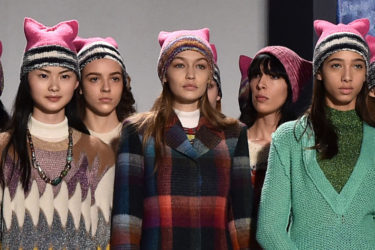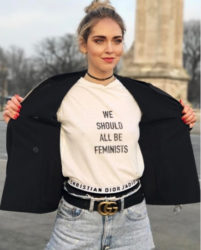Throughout this current political season where populist movements are seemingly growing thicker than wild bush and misogyny is ripe within American politics, I constantly find myself reflecting on how this will influence fashion and the industry at large.

But for the most part, the industry has now chosen to distance itself from Washington. While this will impinge on the economic tradeoff that emerging designers once benefited from, given the sexist remarks voiced by President Trump, it isn’t difficult to understand the distancing. Furthermore it is even easier to understand the reasoning behind brands such as Dior taking inspiration from the politics of it all.

The anti-Trump fashion revolt is having its Vogue moment in exchange for its dwindling relationship with the White House. However, while fashion’s stakeholders have been outraged all across the board and have responded with their ‘Feminist AF’ t-shirts and the celebration of the masses/commoners style, I somehow fear this might just be another surface level trend for women. Though a t-shirt doesn’t make anyone more of a feminist, it does shed light on social movement (which is great), but a strong popular culture that takes on feminism may also result in continued misinterpretation of the feminist movement.
Following the recently held Milan Fashion Week, Missioni models including Jamie Bochert, Gigi Hadid, and Angela Missoni strutted on the runway wearing the famous ‘pink pussycat hats,’ inspired by the first Women’s March. While the effort was good in nature, as some of the proceeds will go to the ACLU and UN Refugee Agency, it was still reflective of the mainstream feminism and not intersectional feminism. The mere fact that such an iconic political fashion statement made its way to the Milan Fashion Week without reflection of its criticism during the Women’s March is evidence of how fashion itself strays away from intersectional feminism. Identifying only for some, but never for all.

The hats received much criticism as they made transgender women feel marginalized and made to feel that womanhood was only truly reflective of those of who had vaginas. Women come in all shapes and sizes and it should not matter if they are straight, gay, rich, poor, bisexual, Muslim, indigenous, transgender, black, white or purple. Fashion’s inability, therefore, to pay homage to women in the wider sense is distasteful.
While the hats and slogan tees may be forgotten by next season, the recent reports which suggest the President wants women he works with to “dress like a woman” highlights even more why brands can’t just piggyback on certain viral movements without sidelining many. According to sources, “Even if you’re in jeans, you need to look neat and orderly.” Insiders who apparently worked on the campaign told Axios that women who worked in President Trump’s campaign field offices and are public-faces “felt pressure to wear dresses” to impress the President.
I suppose he wants them to appear as feminine as possible, despite the reality that many women live it. However, six-inch-heel court shoes and figure hugging pencil dresses do not lend themselves to every situation; not to mention that this look just isn’t reflective of everyone’s personal taste.
Though fashion has responded in a typical capitalist manner, which currently sees the word feminist being thrown around, it is also viewing feminism from a one dimensional perspective. The same way Trump views a woman’s approach to her wardrobe in a one dimensional manner.
Instead of having a revival of the trending topics by brands, a fashionable rebuttal from designers which disputes the influence this will have on women across the board is what is needed; not a general overview from a few privileged white women who haven’t walked in another woman’s shoes. But this should come as no surprise since fashion is one of few places diversity is ever found. Which brings me to another argument, how does an industry which claims to want to celebrate women’s rights find it suitable to still marginalize those of certain ethnic backgrounds and walks of life. Fashion has missed the memo on intersectional feminism.
Hopefully, it can be bold enough in the near future.
http://instagram.com/theonlinerunway




